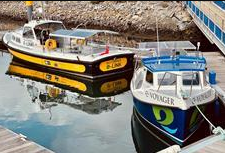To win funding, projects must identify ways of launching a zero-emission vessel by 2025

As part of its ongoing support for green marine technology initiatives, the UK government has allocated £77m in its latest round of investment in projects related to marine leisure or commercial shipping. “The funding will take the tech from the factory to the sea – identifying which projects will have a long-term impact in reducing emissions,” states a press release.
To win funding, projects must identify how they could use the money to launch a zero-emission vessel by 2025 at the latest. Examples of such technology include battery electric vessels, shoreside electrical power, ships running on low carbon fuels like hydrogen or ammonia, and wind-assisted ferries.
Transport Secretary Mark Harper says: “This multimillion-pound investment will help the latest tech ideas become reality and ensure UK waters will play host to green cargo ships, ferries and cruises in the next few years.”
The Zero Emission Vessels and Infrastructure (ZEVI) competition, launched today, will be overseen by Innovate UK, the national innovation agency. The government is also calling on universities across the UK to join forces to establish a new Clean Maritime Research Hub, with £7.4m funding from government and additional funding from academia and industry.
The ZEVI fund and Clean Maritime Research Hub are part of the UK SHORE programme, launched in March 2022 with £206m in funding. UK SHORE aims to tackle shipping emissions and advance the UK towards a sustainable shipping future.
UK commercial shipping activity was responsible for 22 million tonnes of CO2 in 2021 – equivalent to a third of all the UK’s cars, according to the Transport & Environment (T&E) analysis. If the UK government were to include all the sector’s emissions in its cap and trade scheme – the UK ETS – these emissions could generate nearly £2bn annually. However, T&E’s analysis shows that with the government’s current plans, less than 10% of UK shipping emissions would be covered, generating just £170m a year.
The Green Tech Boat Show, which is being held in Southampton from April 21-23 alongside MDL’s South Coast Boat Show, will be the next opportunity for a catch-up on the marine leisure industry and green tech investments. An Innovation Hub will be part of the show which will have Raymarine as its headline sponsor for three years (2023-25). Exhibitors include ePropulsion, Optima Electric Boats, RS Electric, Vita Yachts and Vulkan United Kingdom.
MDL will be holding its Green Innovator Award which is now open for nominations. Now in its second year, the award’s purpose is to distinguish products and services that are pioneering in sustainability, innovation and design. It is aimed at projects from both start-ups and established companies, and highlights suppliers who are making a special effort towards environmentally sustainable practices and product development.
Nominations are now open to every company exhibiting at South Coast & Green Tech Boat Show, or any other business or organisation which has shown initiative in reducing its impact on the environment. The winner of the 2023 Green Innovator Award will be announced on Saturday 22 April during the show which is hosted at MDL’s flagship Ocean Village Marina in the heart of Southampton.
“The driver behind the creation of the Green Tech Boat Show, and its move to Southampton as an integral part of our popular South Coast Boat Show, was to shine a light on the emerging green technology and promote sustainable boating,” says Tim Mayer, sales and marketing director at MDL Marinas.
“The Green Innovator Award takes this one step further and publicly recognises the individual businesses and organisations for their endeavours in this arena, helping combat climate change and making boating as eco-friendly as possible.”
Last year, the first Green Innovator Award was presented to ePropulsion UK, distributor of ePropulsion’s electric marine products across the UK, with Pixii Electric Boats coming in a very close second with its electric boats built using recycled materials.
source:ibi


.png)


